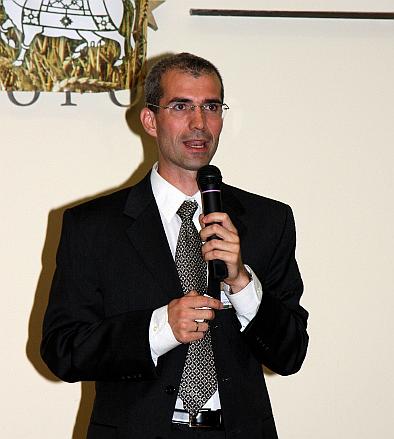UN Invites Hungary’s Eco Valley Foundation to Attend COP16
By Madhava Smullen | Oct 10, 2010

The Eco-Valley Foundation and Sustainability Sciences Research Institute—a non-profit organization run by ISKCON devotees in Hungary—received an invitation from the United Nations this September 20th for the COP16 Climate Summit from November 29th to December 10th in Cancun, Mexico.
The Eco-Valley Foundation (EVF) collects and propagates knowledge about economic, environmental and social issues, and helps people to start and maintain sustainable communities.
Chairman Radha Krishna Dasa is also part of Hungary’s most successful eco-village—ISKCON’s Krishna Valley.
“We want to create a universally adoptable blueprint for living,” he says. “At the heart of this is developing the understanding that we are part of God’s creation, and not the ruler of it. Doing this will inspire us to live in harmony with our surroundings, and to embrace sustainable living.”
Radha Krishna further explains: “There should be three things in a sustainable society: a temple, a school and a place to get together. On a broader level, a temple means that there should be a goal of life that the community is all working to achieve. School doesn’t necessarily mean formal education: it refers to practical life skills such as how to grow crops, how to take care of cows, how to clean your clothes, how to cook, how to build and repair homes, etc. And a place to get together – such togetherness makes people happy, and we would like to see everyone happy.”
EVF has already been busy propagating its message on a major scale: it is affiliated with eight Hungarian universities, and has connections with two more in India and Dubai. It is currently running four scientific research programs, tutoring 32 university student dissertations, and just drew 480 participants to its annual sustainability conference at Krishna Valley—the largest of its kind in Hungary. In addition, Radha Krishna Dasa made 73 presentations around the world within the last year, speaking to university students, scholars, and professionals in India, Dubai, the USA, Sweden, and Denmark.
With the invitation to COP16, however, the Eco-Valley Foundation will get the chance to present its message to some of the world’s biggest decision-makers.
President Obama and over 180 other Heads of State attended last year’s summit, as well as many politicians and environmental and economic ministers. These are also expected to attend this year, as well as thousands of scientists, professors, governmental delegations, and NGO delegations.
“We would like to represent our ideas of simple living and high thinking to those people who can change things in the world,” says Radha Krishna. “And this is a great opportunity to show the leaders of society a liveable, replicable model, and to express our interest in getting to know them and to start working with them.”
The COP summit—the largest meeting of the Conference of the Parties, the supreme body of the UN Framework Convention on Climate Change—is held once a year. COP16 is, of course, the sixteenth annual meeting—the summits have been held since before the Kyoto Protocol came into effect in 1997, establishing legally binding obligations for developed countries to reduce their greenhouse gas emissions.
This year’s and next year’s meetings will focus mainly on discussions about how to renew the Kyoto agreement, which is effective only until 2012. These are of major importance, since if the agreement is not renewed in 2012, countries will have free reign on greenhouse gas emissions and this could have disastrous consequences for the environment.
The two devotees nominated to attend COP16 as representatives of the Eco-Valley Foundation are EVF strategy and development director Vadim Sviridovich, from Russia, and assistant to the chairman George Kirs, from Hungary. Both are economists, while George is also a teacher.
“We have been given admittance as an observer organization, which means that they will be able to attend all the meetings and to give feedback on them in writing,” Radha Krishna says. “They can also apply to set up a separate brainstorming session or discussion that they lead during the climate summit, and have permission to set up an exhibition. Of course, we will also be able to meet and make contacts with people we would like to work with later.”
At their first ever COP meetings, the EVF representatives plan to gather information, draft a proposal, give their input in writing on the issues that are discussed, and express the importance of creating small communities.
“In the future, we would like to work with governmental officials and scientists and universities to help people make sustainable villages and towns, and to develop already existing villages and towns in a more sustainable way,” Radha Krishna says. “We want to show them a model that is a real, practical way of life.”
He concludes: “Ultimately, we would like to show the world in a scientific way that Srila Prabhupada’s teachings on how to live are sustainable and would result in a much happier world than the one we have right now. We want everyone to live a happy life, maintain themselves nicely, and go back to Godhead at the end of their life.”















